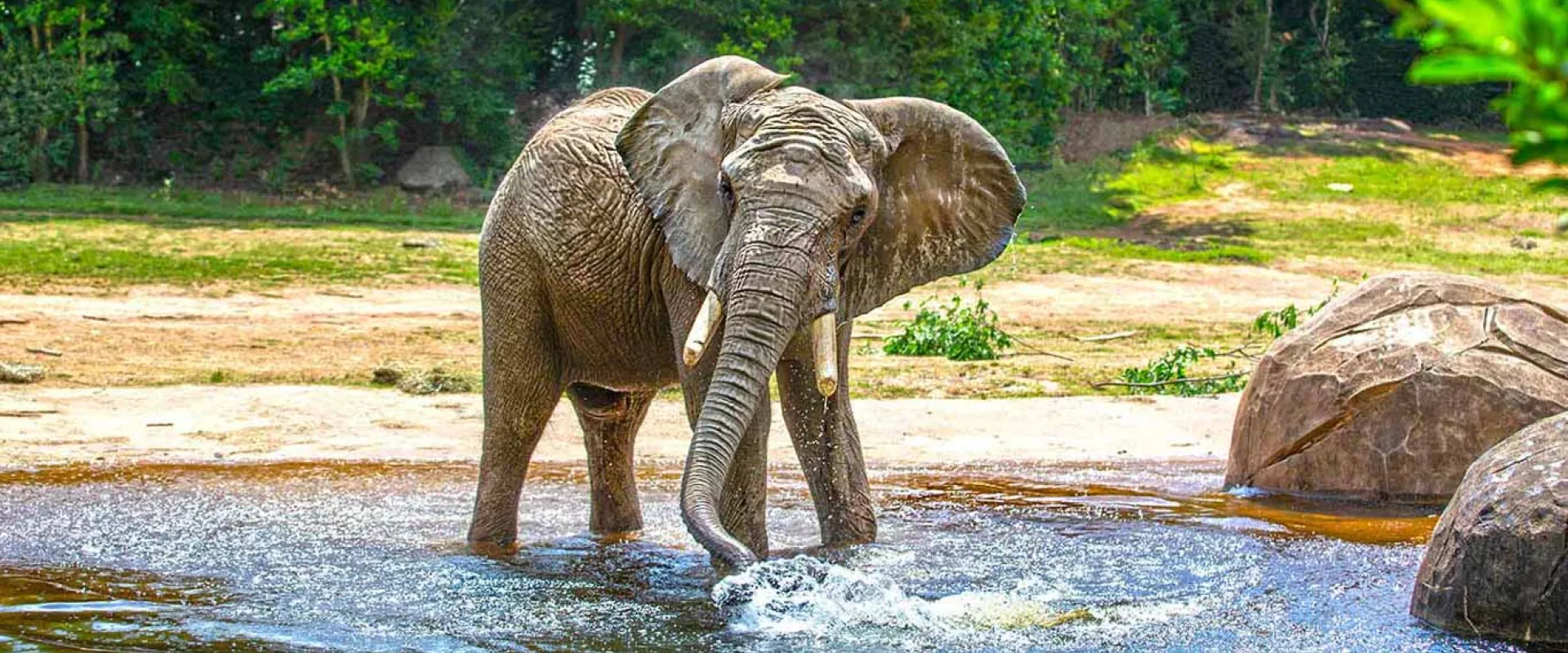Asheboro, N.C. June 3, 2021 - The North Carolina Zoo is excited to announce an African bull elephant, Louie, is joining the Zoo’s herd. Louie arrived on May 25, and he is settling in well to his new habitat.
Louie is an 18-year-old male African elephant, born April 30, 2003, at the Toledo Zoo in Ohio. On June 22, 2017, he went to the Omaha Zoo in Nebraska as part of their breeding program. Louie’s move to the North Carolina Zoo is a recommendation from the African Elephant Species Survival Plan (SSP) through the Association of Zoos and Aquariums. The gradual process of introducing Louie to the Zoo’s herd is already underway. The keepers are hopeful that Louie and one of the Zoo’s females will produce offspring.
“The elephant team is excited to have Louie join our herd. He has been great and is making the transition well. We are thankful to have an Omaha keeper with us to teach us all of his quirks and she has taught us so much already about this handsome guy,” remarked Nancy Kauffman, Animal Management Supervisor.
The North Carolina Zoo currently has seven African elephants: males C’sar, Artie, and now Louie; and females Nekhanda, Rafiki, Tonga, and Batir. This multi-generational herd is managed with two separate habitats on the Watani Grassland, allowing the elephants to socially interact with each other much as they would in the wild.
Male elephants are fully grown by 25 years of age, so Louie is still expected to grow. He currently weighs 8,220 pounds and stands more than nine feet tall at the shoulder. African elephants are well-known as the world’s largest land mammal.
“We are thrilled to welcome Louie to the North Carolina Zoo,” said Secretary Reid Wilson, N.C. Department of Natural and Cultural Resources. “Louie’s arrival not only supports our overarching commitment to the preservation of endangered species, but it also provides a path to growing the elephant population at the Zoo. The North Carolina Zoo has a proud history of world-class elephant care and management, and we welcome Louie to our program and family.”
The future of wild elephants is uncertain as they face significant threats to survival, such as poaching for their ivory tusks and habitat loss. Populations of wild elephants have declined so much that they could go extinct in the wild within the next generation if current trends hold. It is estimated there are currently between 470,000 and 690,000 wild African elephants throughout 37 countries. The future of wild elephants depends on securing their habitat, reducing conflict with people, and preventing killing by poachers.
Since 1998, the North Carolina Zoo has participated in elephant conservation in West Africa. One of the primary tools the Zoo uses to protect the region’s elephants is satellite tracking collars. Once fitted with the special collars, elephant location data can be sent to any internet-connected computer in the world, from where data can be analyzed to mitigate human-elephant conflict, delineate new protected areas utilized by elephants, and increase our knowledge of elephant ecology.
To learn more about the North Carolina Zoo and our elephant program, please visit www.nczoo.org.
About the North Carolina Zoo
At the North Carolina Zoo, we celebrate nature. As the world’s largest natural habitat Zoo, we inspire a lifelong curiosity about animals for the hundreds of thousands of people who visit our Zoo each year. Our dedicated team of experts provides exceptional, compassionate care for the more than 1,800 animals and 52,000 plants that call our Park home. We also lead efforts locally and globally to protect wildlife and wild places because we believe nature’s diversity is critical for our collective future. The North Carolina Zoo invites all of our guests to witness the majesty of the wild in the heart of North Carolina and welcomes everyone to join in our mission to protect nature’s diversity. Visit NCZoo.org to begin your life-changing journey.
About the N.C. Department of Natural and Cultural Resources
The N.C. Department of Natural and Cultural Resources (NCDNCR) is the state agency with a vision to be the leader in using the state’s natural and cultural resources to build the social, cultural, educational and economic future of North Carolina. NCDNCR’s mission is to improve the quality of life in our state by creating opportunities to experience excellence in the arts, history, libraries and nature in North Carolina by stimulating learning, inspiring creativity, preserving the state’s history, conserving the state’s natural heritage, encouraging recreation and cultural tourism, and promoting economic development.
NCDNCR includes 27 historic sites, seven history museums, two art museums, two science museums, three aquariums and Jennette’s Pier, 39 state parks and recreation areas, the North Carolina Zoo, the nation’s first state-supported Symphony Orchestra, the State Library, the State Archives, the N.C. Arts Council, State Preservation Office and the Office of State Archaeology, along with the Division of Land and Water Stewardship. For more information, please call 919- 807-7300 or visit www.ncdcr.gov.
